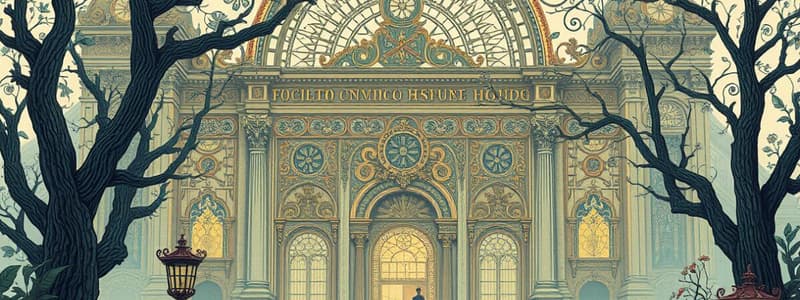Podcast
Questions and Answers
Who is the founder of Ford Automobiles?
Who is the founder of Ford Automobiles?
- Henry Ford (correct)
- Calvin Coolidge
- Warren G. Harding
- Walter Lippmann
What amendment proposed to eliminate legal distinctions based on gender?
What amendment proposed to eliminate legal distinctions based on gender?
Equal Rights Amendment
The 'new woman' in the 1920s refers to women who embraced traditional roles and lifestyles.
The 'new woman' in the 1920s refers to women who embraced traditional roles and lifestyles.
False (B)
What was the Teapot Dome scandal?
What was the Teapot Dome scandal?
What does isolationism refer to in U.S. history?
What does isolationism refer to in U.S. history?
Match the following historical figures with their contributions:
Match the following historical figures with their contributions:
The phrase 'golden door' refers to ___ Island.
The phrase 'golden door' refers to ___ Island.
The quota system significantly increased immigration from Europe in the 1920s.
The quota system significantly increased immigration from Europe in the 1920s.
What does the term 'New Negro' signify?
What does the term 'New Negro' signify?
What was the Harlem Renaissance?
What was the Harlem Renaissance?
What was the outcome of the Scopes Trial?
What was the outcome of the Scopes Trial?
Flashcards
Henry Ford
Henry Ford
Founder of Ford Automobiles; innovated assembly line production.
Equal Rights Amendment
Equal Rights Amendment
Proposed amendment to eliminate gender distinctions; failed after criticism.
Isolationism
Isolationism
U.S. policy after WWI to avoid foreign involvement.
Fordney-McCumber Tariff
Fordney-McCumber Tariff
Signup and view all the flashcards
Teapot Dome Scandal
Teapot Dome Scandal
Signup and view all the flashcards
Harlem Renaissance
Harlem Renaissance
Signup and view all the flashcards
Scopes Trial
Scopes Trial
Signup and view all the flashcards
Quota System
Quota System
Signup and view all the flashcards
Modernism vs. Fundamentalism
Modernism vs. Fundamentalism
Signup and view all the flashcards
Billy Sunday
Billy Sunday
Signup and view all the flashcards
Anti-Defamation League
Anti-Defamation League
Signup and view all the flashcards
Study Notes
Key Figures and Concepts
-
Henry Ford: Founder of Ford Automobiles; revolutionized production with the assembly line for the Model T, promoting workforce purchasing power.
-
Andrew Siegfried's "new society": Concept of a society prioritizing the defense of living standards as a crucial and sacred achievement.
Legislation and Movements
-
Equal Rights Amendment: Proposed by Alice Paul and the National Women's Party; aimed to eliminate gender distinctions. Encountered criticism from feminist groups; ultimately failed.
-
Isolationism: U.S. stance post-WWI aimed at minimizing foreign involvement and rejection of Wilson's League of Nations.
Economic Policies
-
Fordney-McCumber Tariff: 1922 tariff that significantly increased duties on imports, setting record levels.
-
Consumerism: Reflected by Lynd's findings in Middletown; emphasis on consumer goods and leisure over political engagement.
Political Leadership
-
Warren G. Harding: 29th U.S. president, whose administration was marked by corruption, died in office in 1923; promoted "normalcy".
-
Calvin Coolidge: Followed Harding as president, known for his veto of the McNary-Haugen Bill and reelection in 1924.
Scandals and Controversies
- Teapot Dome Scandal: Involved Secretary of the Interior Albert Fall leasing government oil reserves for bribes. Fall was the first cabinet member convicted of a felony.
Cultural Shifts
-
"new woman": Refers to the 1920s shift in women's behavior, exhibiting newfound freedoms in attire, social activities, and public life.
-
Lost Generation: Writers disillusioned by materialism post-WWI, many sought solace in Europe.
Civil Liberties and Legal Cases
-
American Civil Liberties Union: Established to defend rights post-Sedition Acts; involved in pivotal civil rights cases.
-
Schenck vs. U.S.: Supreme Court case limiting free speech in cases posing a "clear and present danger".
Religious and Ideological Divides
-
Modernism vs. Fundamentalism: Clashes between modernist integration of science with religion and fundamentalist literal interpretations of the Bible.
-
Billy Sunday: Former baseball player turned revivalist preacher; advocated against modernism, attracting large audiences.
Cultural Flourishing
- Harlem Renaissance: Cultural movement marked by a flourishing of Black arts, featuring notable figures like Claude McKay and Langston Hughes.
Immigration and Social Justice
-
Quota System: Implemented in 1921 to limit immigration from Europe, resulting in significant reductions in newcomer numbers.
-
Anti-Defamation League: Formed to combat anti-Semitism and promote legal protections against discrimination.
Notable Trials and Court Decisions
-
Scopes Trial: 1925 trial of John Scopes for teaching evolution, attracting national attention. Defended by Clarence Darrow; initial verdict later overturned.
-
Pierce v. Society of Sisters: Supreme Court case recognizing the right to private education.
Artistic Expressions
-
Cotton Club: Exclusive Harlem club epitomizing racial segregation in entertainment, owned by whites.
-
Bill Robinson: Renowned Black tap dancer celebrated for Broadway performances.
Significant Authors
-
Countee Cullen: Leading American Romantic poet of the Harlem Renaissance.
-
Langston Hughes: Renowned for capturing Black culture in poetic form, famous works include "Harlem".
Miscellaneous
-
"Golden Door": Nickname for Ellis Island, representing immigration transitions pre and post-WWI.
-
Bootleggers: Individuals illicitly selling alcohol during Prohibition, often engaging in corruption with officials.
Studying That Suits You
Use AI to generate personalized quizzes and flashcards to suit your learning preferences.



